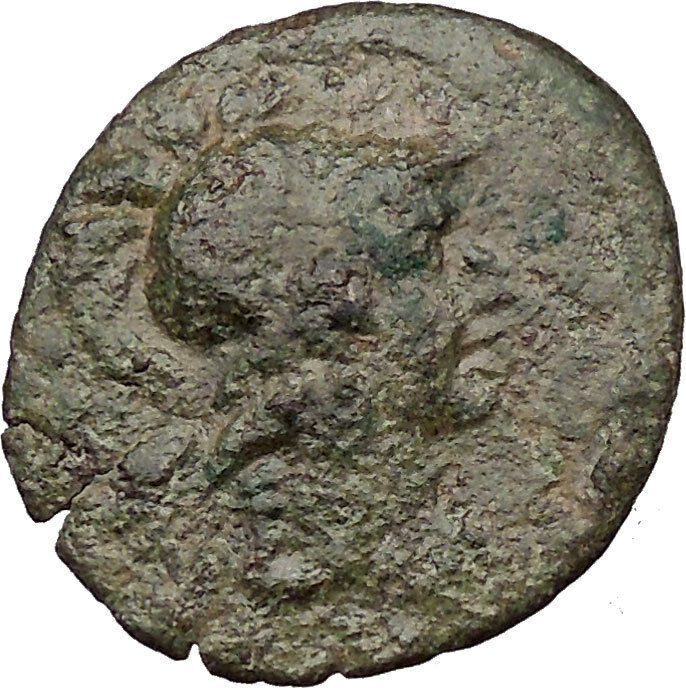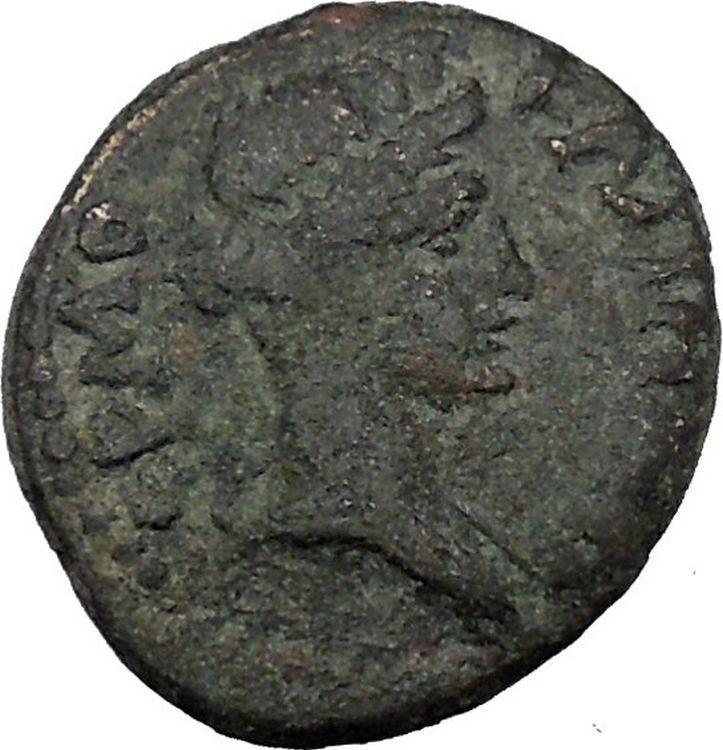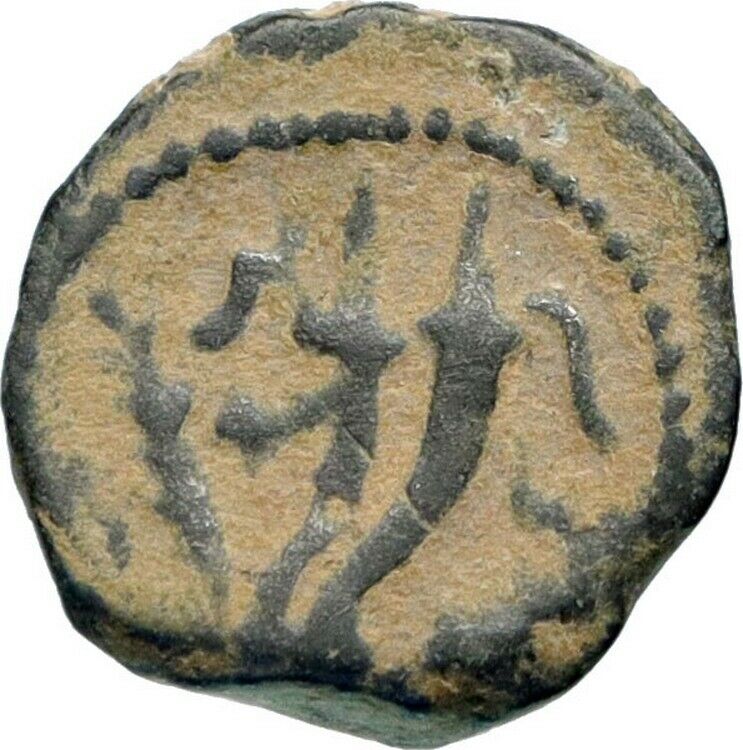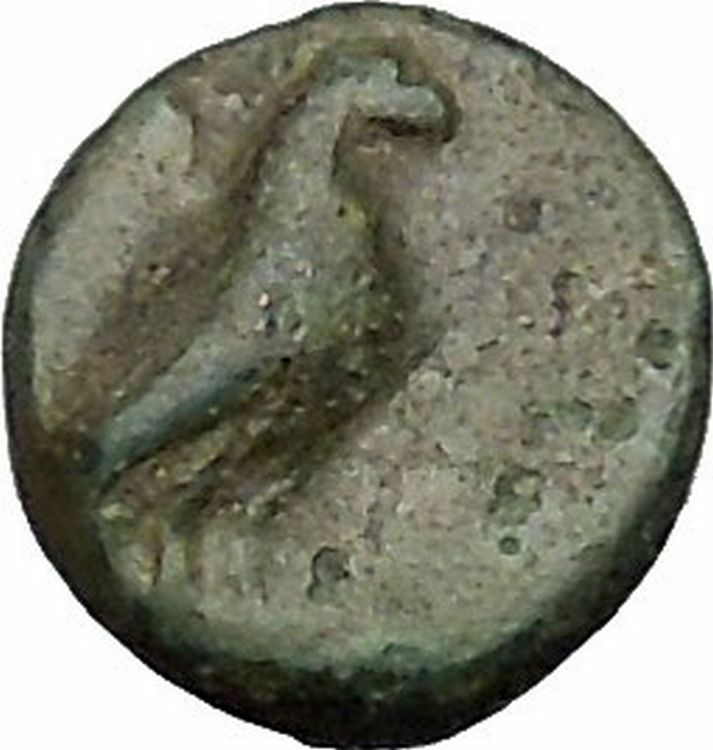|
Greek city of
Larissa
in
Thessaly
under
Thesssalian League
Bronze 18mm (7.19 grams) Struck
196-27 B.C.
Hippolochos, magistrate.
Reference: Rogers 21; SNG Copenhagen 315
Laureate head of Apollo right.
ΘEΣΣA/ΛΩN, Athena Itonia striding right, hurling spear
held in her right hand, shield on her left arm;
above spear; IΠΠ-OΛO;
A to left; to right, P above I.
Following the great victory of the
Roman general Flamininus over Philip V of Macedon, in
197 B.C., the freedom of the Greeks was proclaimed at
Corinth and a number of new autonomous coinages were
initiated. Those in the name of the Thessali were struck
probably at Larissa. The Thessalian League was a
loose confederacy of feudal-like city-states and tribes
in the Thessalian valley in Northern
Greece
and was run by a
few aristocratic Thessalian families (Aleuadae
and Skopadae). The seat of the Thessalian diet was
Larissa
.
You
are bidding on the exact item pictured, provided with a
Certificate of Authenticity and Lifetime Guarantee of
Authenticity.
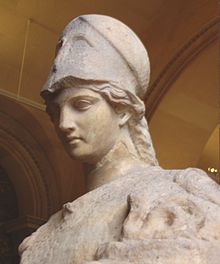
Helmeted Athena with the cista and
Erichthonius in his serpent form. Roman, first
century (Louvre
Museum)
In
Greek religion
and
mythology
, Athena
or Athene, also referred to as Pallas Athena/Athene
, is the goddess of wisdom, courage, inspiration,
civilization, law and justice, just warfare,
mathematics, strength, strategy, the arts, crafts, and
skill.
Minerva
is the
Roman goddess
identified with
Athena.
Athena is also a shrewd companion of
heroes
and is the
goddess
of heroic
endeavour. She is the
virgin
patroness of
Athens
. The Athenians
founded the
Parthenon
on the
Acropolis of her namesake city, Athens (Athena Parthenos),
in her honour.
Athena’s veneration as the patron of Athens seems to
have existed from the earliest times, and was so
persistent that archaic myths about her were recast to
adapt to cultural changes. In her role as a protector of
the city (polis),
many people throughout the Greek world worshiped Athena
as Athena Polias (Ἀθηνᾶ Πολιάς “Athena of the
city”). The city of
Athens
and the goddess
Athena essentially bear the same name, “Athenai” meaning
“[many] Athenas”.
Patroness

Athenian
tetradrachm
representing the goddess Athena
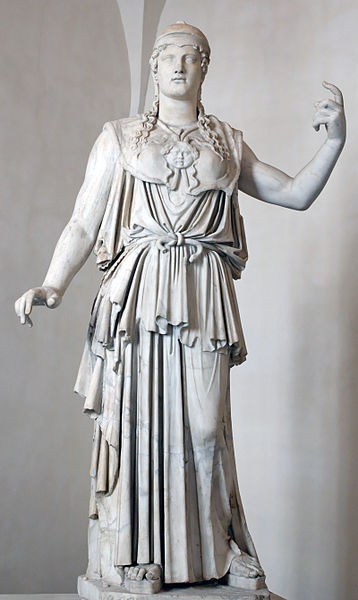
Athena
as the goddess of philosophy became an aspect of the
cult in Classical Greece during the late 5th century
B.C. She is the patroness of various crafts, especially
of
weaving
, as Athena
Ergane, and was honored as such at festivals such as
Chalceia
. The metalwork
of weapons also fell under her patronage. She led
battles (Athena
Promachos or the warrior maiden Athena
Parthenos) as the disciplined, strategic side of
war, in contrast to her brother
Ares
, the patron of
violence, bloodlust and slaughter—”the raw force of
war”. Athena’s wisdom includes the cunning intelligence
(metis) of such figures as
Odysseus
. Not only was
this version of Athena the opposite of Ares in combat,
it was also the polar opposite of the serene earth
goddess version of the deity, Athena Polias.
Athena appears in Greek mythology as the patron and
helper of many heroes, including
Odysseus
,
Jason
, and
Heracles
. In
Classical Greek
myths,
she never consorts with a lover, nor does she ever
marry,earning the title Athena Parthenos. A
remnant of archaic myth depicts her as the adoptive
mother of
Erechtheus
/Erichthonius
through the foiled rape by
Hephaestus
. Other
variants relate that Erichthonius, the serpent that
accompanied Athena, was born to
Gaia
: when the rape
failed, the semen landed on Gaia and impregnated her.
After Erechthonius was born, Gaia gave him to Athena.
Though Athena is a goddess of war strategy, she
disliked fighting without purpose and preferred to use
wisdom to settle predicaments.The goddess only
encouraged fighting for a reasonable cause or to resolve
conflict. As patron of Athens she fought in the Trojan
war on the side of the Achaeans..
Mythology
Lady
of Athens
Athena competed with
Poseidon
to be the
patron deity of Athens, which was yet unnamed, in a
version of one
founding myth
. They
agreed that each would give the Athenians one gift and
that the Athenians would choose the gift they preferred.
Poseidon struck the ground with his
trident
and a salt
water spring sprang up; this gave them a means of trade
and water—Athens at its height was a significant sea
power, defeating the
Persian
fleet at the
Battle of Salamis
—but
the water was salty and not very good for drinking.
Athena, however, offered them the first domesticated
olive tree
. The
Athenians (or their king,
Cecrops
) accepted the
olive tree and with it the patronage of Athena, for the
olive tree brought wood, oil, and food.
Robert Graves
was of
the opinion that “Poseidon’s attempts to take possession
of certain cities are political myths” which reflect the
conflict between matriarchal and patriarchal religions.
Other sites of cult
Athena also was the patron goddess of several other
Greek cities, notably Sparta, where the archaic cult of
Athena Alea
had its
sanctuaries in the surrounding villages of
Mantineia
and, notably,
Tegea
. In Sparta
itself, the temple of Athena Khalkíoikos (Athena
“of the Brazen House”, often
latinized
as
Chalcioecus) was the grandest and located on the
Spartan acropolis; presumably it had a roof of bronze.
The forecourt of the Brazen House was the place where
the most solemn religious functions in Sparta took
place.
Tegea was an important religious center of ancient
Greece, containing the Temple of
Athena Alea
. The
temenos was founded by
Aleus
,
Pausanias
was informed.
Votive bronzes at the site from the Geometric and
Archaic periods take the forms of horses and deer; there
are
sealstone
and
fibulae
. In the Archaic
period the nine villages that underlie Tegea banded
together in a
synoecism
to form one
city. Tegea was listed in
Homer
‘s
Catalogue of Ships
as
one of the cities that contributed ships and men for the
Achaean assault on Troy
.
Judgment of Paris

Aphrodite is being surveyed by Paris, while
Athena (the leftmost figure) and Hera stand
nearby.
El Juicio de Paris
by
Enrique Simonet
,
ca. 1904
All the gods and goddesses as well as various mortals
were invited to the marriage of
Peleus
and
Thetis
(the eventual
parents of
Achilles
). Only
Eris
, goddess of
discord, was not invited. She was annoyed at this, so
she arrived with a golden apple inscribed with the word
καλλίστῃ (kallistēi, “for the fairest”), which she threw
among the goddesses. Aphrodite, Hera, and Athena all
claimed to be the fairest, and thus the rightful owner
of the apple.
The goddesses chose to place the matter before Zeus,
who, not wanting to favor one of the goddesses, put the
choice into the hands of Paris, a
Trojan
prince. After
bathing in the spring of
Mount Ida
(where Troy
was situated), the goddesses appeared before Paris. The
goddesses undressed and presented themselves to Paris
naked, either at his request or for the sake of winning.

Paris is awarding the apple to Aphrodite,
while Athena makes a face. Urteil des
Paris by
Anton Raphael Mengs
,
ca. 1757
Still, Paris could not decide, as all three were
ideally beautiful, so they resorted to bribes. Hera
tried to bribe Paris with control over all
Asia
and
Europe
, while Athena
offered wisdom, fame and glory in battle, but Aphrodite
came forth and whispered to Paris that if he were to
choose her as the fairest he would have the most
beautiful mortal woman in the world as a wife, and he
accordingly chose her. This woman was
Helen
, who was,
unfortunately for Paris, already married to King
Menelaus
of
Sparta
. The other two
goddesses were enraged by this and through Helen’s
abduction by Paris they brought about the
Trojan War
.

The Parthenon
,
Temple of Athena Parthenos
Masculinity and feminism
Athena had an “androgynous compromise” that allowed
her traits and what she stood for to be attributed to
male and female rulers alike over the course of history
(such as Marie de’ Medici, Anne of Austria, Christina of
Sweden, and Catherine the Great)
J.J. Bachofen advocated that Athena was originally a
maternal figure stable in her security and poise but was
caught up and perverted by a patriarchal society; this
was especially the case in Athens. The goddess adapted
but could very easily be seen as a god. He viewed it as
“motherless paternity in the place of fatherless
maternity” where once altered, Athena’s character was to
be crystallized as that of a patriarch.
Whereas Bachofen saw the switch to paternity on
Athena’s behalf as an increase of power, Freud on the
contrary perceived Athena as an “original mother goddess
divested of her power”. In this interpretation, Athena
was demoted to be only Zeus’s daughter, never allowed
the expression of motherhood. Still more different from
Bachofen’s perspective is the lack of role permanency in
Freud’s view: Freud held that time and differing
cultures would mold Athena to stand for what was
necessary to them.
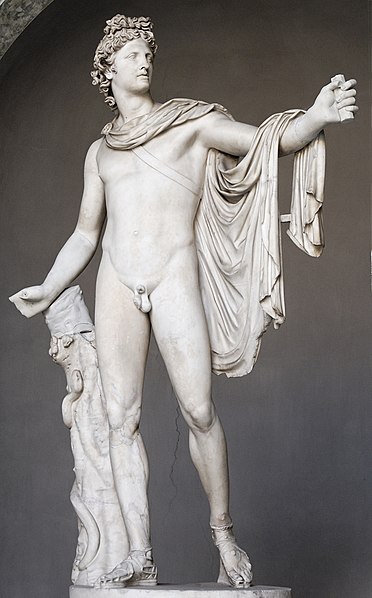
Apollo Belvedere
,
ca. 120–140 CE
Apollo is one of the most important and
complex of the
Olympian deities
in
ancient Greek
and
Roman religion
,
Greek
and
Roman mythology
, and
Greco
–Roman
Neopaganism
. The ideal
of the
kouros
(a
beardless, athletic youth), Apollo has been variously
recognized as a god of light and the sun, truth and
prophecy, healing, plague, music, poetry, and more.
Apollo is the son of
Zeus
and
Leto
, and has a twin
sister, the chaste huntress
Artemis
. Apollo is
known in Greek-influenced
Etruscan mythology
as
Apulu.
As the patron of
Delphi
(Pythian
Apollo), Apollo was an
oracular
god—the
prophetic deity of the
Delphic Oracle
.
Medicine and healing are associated with Apollo, whether
through the god himself or mediated through his son
Asclepius
, yet Apollo
was also seen as a god who could bring ill-health and
deadly
plague
. Amongst the
god’s custodial charges, Apollo became associated with
dominion over
colonists
, and as the
patron defender of herds and flocks. As the leader of
the
Muses
(Apollon
Musegetes) and director of their choir, Apollo
functioned as the patron god of music and poetry.
Hermes
created the
lyre
for him, and the
instrument became a common
attribute of Apollo
.
Hymns sung to Apollo were called
paeans
.
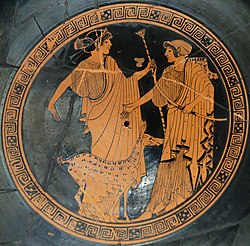
Apollo (left) and
Artemis
.
Brygos
(potter signed), Tondo of an Attic
red-figure cup c. 470 BC,
Musée du Louvre
.
In Hellenistic times, especially during the 3rd
century BCE, as Apollo Helios he became
identified among Greeks with
Helios
,
Titan
god of the sun
, and his
sister Artemis similarly equated with
Selene
, Titan
goddess of the moon
In
Latin texts, on the other hand,
Joseph Fontenrose
declared himself unable to find any conflation of Apollo
with
Sol
among the
Augustan poets
of the
1st century, not even in the conjurations of
Aeneas
and
Latinus
in
Aeneid
XII
(161–215). Apollo and Helios/Sol remained separate
beings in literary and mythological texts until the 3rd
century CE.
Origins

The
Omphalos
in
the Museum of
Delphi
.
The cult centers of Apollo in Greece,
Delphi
and
Delos
, date from the
8th century BCE. The Delos sanctuary was primarily
dedicated to
Artemis
, Apollo’s twin
sister. At Delphi, Apollo was venerated as the slayer of
Pytho
. For the Greeks,
Apollo was all the Gods in one and through the centuries
he acquired different functions which could originate
from different gods. In
archaic Greece
he was
the
prophet
, the oracular
god who in older times was connected with “healing”. In
classical Greece
he was
the god of light and of music, but in popular religion
he had a strong function to keep away evil.
From his eastern-origin Apollo brought the art of
inspection from “symbols and
omina
” (σημεία και
τέρατα : semeia kai terata), and of the
observation of the
omens
of the days. The
inspiration oracular-cult was probably introduced from
Anatolia
. The
ritualism
belonged to
Apollo from the beginning. The Greeks created the
legalism
, the
supervision of the orders of the gods, and the demand
for moderation and harmony. Apollo became the god of
shining youth, the protector of music, spiritual-life,
moderation and perceptible order. The improvement of the
old
Anatolian
god, and his
elevation to an intellectual sphere, may be considered
an achievement of the
Greek
people.
Healer and god-protector from evil
The function of Apollo as a “healer” is connected
with
Paean
, the physician
of the Gods in the
Iliad
, who seems to
come from a more primitive religion. Paeοn is probably
connected with the
Mycenean
Pa-ja-wo, but
the etymology is the only evidence. He did not have a
separate cult, but he was the personification of the
holy magic-song sung by the magicians that was supposed
to cure disease. Later the Greeks knew the original
meaning of the relevant song “paean”. The magicians were
also called “seer-doctors”, and they used an ecstatic
prophetic art which was used exactly by the god Apollo
at the oracles.
In the Iliad, Apollo is the healer under the
gods, but he is also the bringer of disease and death
with his arrows, similar to the function of the terrible
Vedic
god of disease
Rudra
.He sends a
terrible plague to the
Achaeans
. The god who
sends a disease can also prevent from it, therefore when
it stops they make a purifying ceremony and offer him an
“hecatomb” to ward off evil. When the oath of his priest
appeases, they pray and with a song they call their own
god, the beautiful Paean.
Some common epithets of Apollo as a healer are
“paion” , “epikourios”, “oulios”, and “loimios” . In
classical times, his strong function in popular religion
was to keep away evil, and was therefore called
“apotropaios” and “alexikakos” , throw away the evil).
In later writers, the word, usually
spelled “Paean”, becomes a mere epithet of Apollo in his
capacity as a god of
healing
.
Homer illustrated Paeon the god, and the song both of
apotropaic
thanksgiving
or triumph. Such songs were originally addressed to
Apollo, and afterwards to other gods: to
Dionysus
, to Apollo
Helios
, to Apollo’s son
Asclepius
the healer.
About the 4th century BCE, the paean became merely a
formula of adulation; its object was either to implore
protection against disease and misfortune, or to offer
thanks after such protection had been rendered. It was
in this way that Apollo had become recognised as the god
of music. Apollo’s role as the slayer of the
Python
led to his
association with battle and victory; hence it became the
Roman
custom for a
paean to be sung by an army on the march and before
entering into battle, when a fleet left the harbour, and
also after a victory had been won.
Oracular cult

Columns of the
Temple of Apollo
at Delphi, Greece.
Unusually among the Olympic deities, Apollo had two
cult sites that had widespread influence:
Delos
and
Delphi
. In cult
practice,
Delian Apollo
and
Pythian Apollo
(the
Apollo of Delphi) were so distinct that they might both
have shrines in the same locality.Apollo’s
cult
was already fully
established when written sources commenced, about 650
BCE. Apollo became extremely important to the Greek
world as an oracular deity in the
archaic period
, and the
frequency of
theophoric names
such
as Apollodorus or Apollonios and cities
named Apollonia testify to his popularity.
Oracular sanctuaries to Apollo were established in other
sites. In the 2nd and 3rd century CE, those at
Didyma
and
Clarus
pronounced the
so-called “theological oracles”, in which Apollo
confirms that all deities are aspects or servants of an
all-encompassing, highest deity
.
“In the 3rd century, Apollo fell silent.
Julian the Apostate
(359 – 61) tried to revive the Delphic oracle, but
failed

In
Greek
and
Roman mythology
, Apollo
,
is one of the most important and diverse of the
Olympian deities
. The ideal of the
kouros
(a
beardless youth), Apollo has been variously recognized as a god of light and the
sun; truth and prophecy;
archery
;
medicine and healing; music, poetry, and the arts; and more. Apollo is the son
of Zeus
and
Leto, and has a
twin
sister, the chaste huntress
Artemis
.
Apollo is known in Greek-influenced
Etruscan mythology
as Apulu. Apollo was worshiped in both
ancient Greek
and
Roman religion
, as well as in the modern
Greco
–Roman
Neopaganism
.
As the patron of Delphi
(Pythian Apollo), Apollo was an
oracular
god — the prophetic deity of the
Delphic Oracle
.
Medicine and healing were associated with Apollo, whether through the god
himself or mediated through his son
Asclepius
,
yet Apollo was also seen as a god who could bring ill-health and deadly
plague
as well as one who had the ability to cure. Amongst the god’s
custodial charges, Apollo became associated with dominion over
colonists
, and as the patron defender of herds and flocks. As the leader of
the Muses
(Apollon
Musagetes) and director of their choir, Apollo functioned as the patron god
of music and poetry
.
Hermes
created
the lyre
for him,
and the instrument became a common
attribute
of Apollo. Hymns sung to Apollo were called
paeans
.
In Hellenistic times, especially during the third century BCE, as Apollo
Helios he became identified among Greeks with
Helios
,
god of
the sun
, and his sister Artemis similarly equated with
Selene
,
goddess
of the moon
.
In Latin texts, on the other hand, Joseph Fontenrose declared himself unable to
find any conflation of Apollo with
Sol
among the
Augustan poets
of the first century, not even in the conjurations of
Aeneas
and
Latinus
in
Aeneid
XII
(161–215).
Apollo and Helios/Sol remained separate beings in literary and mythological
texts until the third century CE.
Larissa, sometimes written Larisa on
ancient coins and inscriptions, is near the site of the
Homeric Argissa. It appears in early times, when
Thessaly
was mainly governed by a few aristocratic
families, as an important city under the rule of the
Aleuadae
, whose authority extended over the whole
district of
Pelasgiotis
. This powerful family possessed for many
generations before 369 BC the privilege of furnishing
the tagus, the local term for the
strategos
of the combined Thessalian forces. The
principal rivals of the Aleuadae were the
Scopadac
of
Crannon
, the remains of which (called by the Turks
Old Larissa) are about 14 miles south west. The
inhabitants sided with
Athens
during the Peloponnesian War.
As the chief city of ancient
Thessaly, Larissa was directly annexed by Philip II of
Macedon in 344, and from then on Larissa was under
Macedonian control; in 196 B.C. Larissa became an ally
of Rome and was the headquarters of the
Thessalian League
.
Coordinates
 39°38.5′N 39°38.5′N
22°25′E
|


















